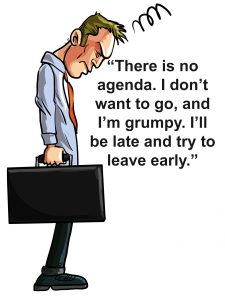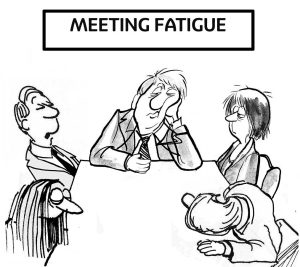Meeting Fatigue (The Cure for the Meeting Oppressed)
By Colle Davis
 Decades ago, some meetings were considered informative and productive events. They were ‘meaty meetings’ where leaders aimed to increase productivity guidelines. These guidelines are still valid and increase the time value of everyone’s time and talents if they are planned and conducted to achieve their intended outcomes.
Decades ago, some meetings were considered informative and productive events. They were ‘meaty meetings’ where leaders aimed to increase productivity guidelines. These guidelines are still valid and increase the time value of everyone’s time and talents if they are planned and conducted to achieve their intended outcomes.
(Left image) This chat is the drone of oppressed meeting attendees, even if it’s done in silence.
Here are nine points to follow to achieve attendance and results:
-
- An agenda of issues will be emailed to all attendees, along with the date, time, location, and a list of attendees.
- This agenda must be available at least 48 hours ahead of the meeting time.
- No new items may be added to the agenda within 24 hours of the meeting time.
- The meeting will start on time whether the leader is there or not.
- Someone is assigned to take notes to ensure everyone has a list of action items the following day.
- If a topic is not on the agenda, it may not be presented in the meeting.
- Any new items must be placed on the next meeting’s agenda.
- No meeting should exceed 75 minutes without a biological needs break.
- No meeting may exceed two hours.
Do you notice anything that stands out in the guidelines? Everyone is responsible for every part of the agenda. The leader or anyone else can be called out for violating any steps. Meetings using these guidelines are relaxed (generally) and productive because everyone is responsible.
 When the time arrived, the leader opened the meeting, and the big guy walked in and sat in the back. Eighteen minutes into the meeting, all items had been reviewed, the designated note taker cleared up a couple of points, action items were assigned, the next meeting’s agenda had several items added, and everyone left. The big guy looked confused, came to the front of the room, and asked the leader, what happened? He was informed of the guidelines all meetings were now following as outlined above. He could not believe they had such a short, productive meeting.
When the time arrived, the leader opened the meeting, and the big guy walked in and sat in the back. Eighteen minutes into the meeting, all items had been reviewed, the designated note taker cleared up a couple of points, action items were assigned, the next meeting’s agenda had several items added, and everyone left. The big guy looked confused, came to the front of the room, and asked the leader, what happened? He was informed of the guidelines all meetings were now following as outlined above. He could not believe they had such a short, productive meeting.
Side note: The new meeting requirements at the company freed up over an hour and a half a day, or the equivalent of adding one full day a week to productive work for the whole division. The company was amazed, even though headquarters did not understand what was happening.
Meetings that don’t produce buy-in, tasks, and outcomes are NOT meetings. Instead, they’re a gabfest to reinforce power structures between leaders.
 Here is a doomsday scenario for meetings:
Here is a doomsday scenario for meetings:
-
- No agenda. Low attendance. Glum faces and slumped torsos seem to have fallen into chairs.
- The group discusses and mumbles topics covered in the last meeting.
- The meeting is regularly scheduled for a specific day and time.
- The meeting lasts several hours every week.
- Coffee or snacks are not available during lengthy face-to-face meetings.
- Attendees regularly leave the meetings for biological needs breaks because no formal breaks are called. Once they leave, they also take time to return calls and check their email.
 Here’s the outcome of a productive meeting:
Here’s the outcome of a productive meeting:
-
- The meeting starts on time.
- The meeting lasts until all the items on the agenda have been reviewed and action items assigned.
- The designated note-taker cleared up any questions.
- The next meeting’s agenda items are added.
- Meeting adjourned.
**For more on the topic, see: https://www.axios.com/2023/01/05/shopify-combats-meeting-madness
and more importantly https://phys.org/news/2023-02-four-day-week-boosts-employee-well-being.html
